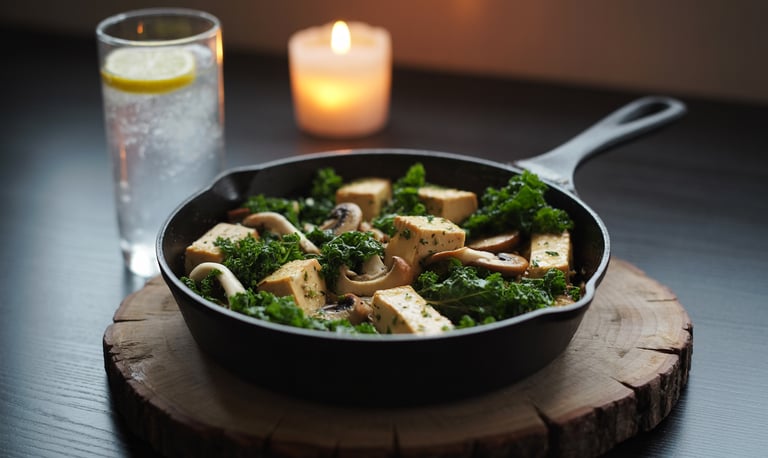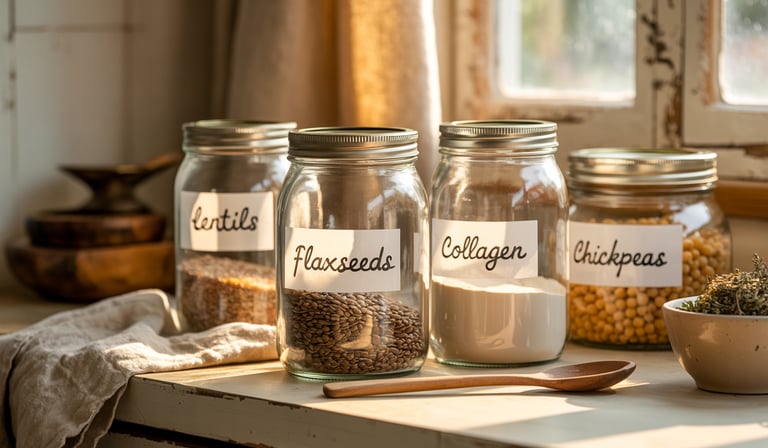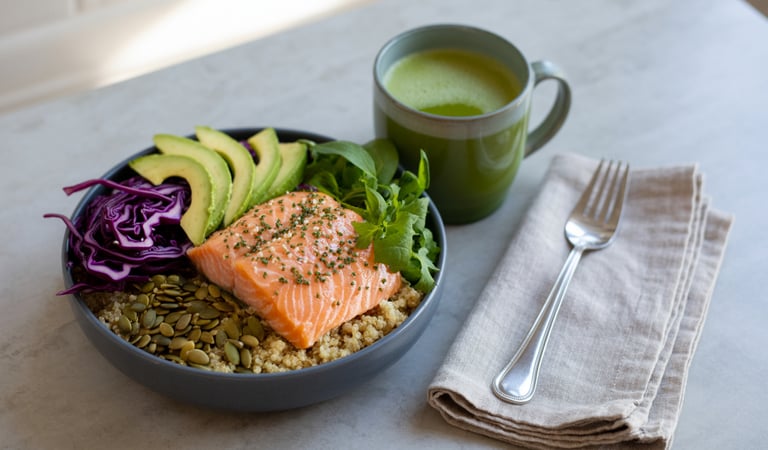Fuel Your Hormones and Energy with These High Protein Meals
These high-protein meals aren’t just delicious—they’re made to support hormone balance, boost energy, and nurture your body from the inside out.
SELF-CARE AND WELLNESSFOOD IDEAS
FONNI
4/30/202510 min read


The content on this website was created with the help of AI. LOVEOWE LLC is a participant in the Amazon Services LLC Associates Program, an affiliate advertising program designed to provide a means for sites to earn fees by linking to Amazon.com and affiliated sites. This site utilizes affiliate links, meaning if you purchase a product via a link on this site, I may earn a small commission at no cost to you. All opinions remain my own. I get commissions for purchases made through links in this post. For more info, click here. Thank you for your support!
I vividly recall those days when exhaustion seemed to follow me everywhere, despite adequate sleep and a balanced diet. It wasn't until I began focusing on the right foods that my life changed. My energy soared, my mood evened out, and I exuded a newfound confidence.
The turning point was adding high protein meals to my diet, which significantly impacted my hormone balance. By consuming the right nutrients, I naturally increased my energy. This article delves into the link between protein and hormone health. I'll also share tasty energy-boosting recipes to kickstart your path to a more balanced life.
The Connection Between Protein, Hormones, and Energy
Understanding the relationship between protein, hormones, and energy is key to overall well-being. Protein is more than just a muscle builder; it's vital for hormone production and energy levels.
How Protein Influences Hormone Production
Protein is essential for hormone synthesis. Hormones are made from amino acids, the building blocks of proteins. Without enough protein, hormone production is impaired. This can cause hormonal imbalances, affecting metabolism and reproductive health.
Why Adequate Protein Is Essential for Energy Levels
Adequate protein intake is vital for energy. It helps regulate blood sugar and prevents energy crashes. Protein also requires more energy to digest than carbs or fat, boosting metabolism and aiding in weight management.
By grasping how protein affects hormone production and energy, we see its dietary importance. This knowledge helps us make better nutrition choices, impacting our health positively.
Key Nutrients That Support Hormone Balance
To keep our hormones in check, we need to eat the right foods. The nutrients we take in greatly affect hormone production and balance. A balanced diet is key for our hormonal health.
Essential Amino Acids and Their Functions
Essential amino acids are vital for hormone production. They help make hormones like insulin, growth hormone, and thyroid hormones. Our bodies can't make these amino acids, so we must get them from food. Important amino acids include leucine, isoleucine, and histidine, which help regulate hormones.
Micronutrients That Work Alongside Protein
Vitamins and minerals are also essential for hormone balance. Vitamin D, for example, affects hormone production. Minerals like zinc and magnesium help with energy and hormone regulation.
It's important to get enough of these micronutrients for hormonal balance.
By focusing on essential amino acids and micronutrients, we can support our hormone balance and overall health.
Signs Your Body Needs More Protein for Hormonal Health
If you're feeling persistently fatigued, weak, or noticing hair loss, it could signal a protein deficiency. Protein is key for hormone production and overall health. A lack of it can cause a variety of problems, from physical symptoms to hormonal imbalances.
Physical Symptoms of Protein Deficiency
Protein deficiency can show up in different ways. Some common signs include:
Fatigue and weakness
Poor wound healing
Hair loss or thinning
Swelling in the legs, feet, and hands
These symptoms happen because protein is vital for tissue repair and growth. Without enough, your body can't work at its best.
Hormonal Imbalances Related to Low Protein Intake
A diet lacking in protein can upset hormone levels, causing imbalances. Hormones control many bodily functions, like metabolism and growth. Some hormonal issues linked to low protein include:
Thyroid hormone imbalances
Cortisol level disruptions
Insulin sensitivity changes
It's important to get enough protein to keep hormones balanced and maintain health.
High Protein Meals That Support Hormone Health & Energy
High protein meals are vital for more than just muscle building. They play a key role in hormone balance and energy levels. Adequate protein gives our bodies the necessary building blocks for hormone production. This ensures our endocrine system works at its best.
Optimal Protein Sources for Hormone Balance
It's important to include a variety of protein sources in your diet for hormone health. Lean meats like chicken and turkey, fish with omega-3s like salmon, and plant-based options like lentils and tofu are beneficial. These foods provide protein and other nutrients vital for hormone production and balance.
Creating Balanced Meals for Maximum Hormonal Benefit
To get the most hormonal benefits from high protein meals, balance is key. This means considering the protein-to-carb ratio and adding healthy fats to your meals.
Protein-to-Carb Ratios for Hormone Support
A balanced protein-to-carb ratio helps regulate blood sugar and supports hormone production. Aiming for a meal with 30 grams of protein and 20 grams of carbs can be beneficial. Experimenting with different ratios helps find what's best for your body.
Incorporating Healthy Fats for Hormone Production
Healthy fats, found in avocados, nuts, and olive oil, are essential for hormone production. They provide the necessary fats for steroid hormone synthesis. Adding healthy fats to your high protein meals boosts their hormonal benefits.
By focusing on whole, nutrient-dense foods and balancing macronutrients, you can create meals that support hormone health and energy. These meals contribute to sustained energy levels all day long.
Energizing Breakfast Options Rich in Protein
Starting your day with a high-protein breakfast is key to boosting energy and supporting hormone health. A nutritious morning meal not only energizes you but also aids in hormone balance all day long.
Quick Morning Protein Recipes
Adding protein to your breakfast is both simple and tasty. Here are some quick, nutritious breakfast ideas that are high in protein.
Greek Yogurt Parfait with Nuts and Berries
A Greek yogurt parfait is a fantastic way to get a good dose of protein in the morning. Layer Greek yogurt with your favorite nuts and berries in a bowl. This breakfast is not only high in protein but also rich in fiber and antioxidants. Try using almonds or walnuts for added crunch and a burst of flavor.
Protein-Packed Overnight Oats
Overnight oats are another great breakfast option that can be made in advance. Mix rolled oats with milk or a dairy-free alternative, add a scoop of your favorite protein powder, and top with nuts or seeds. Refrigerate overnight and enjoy in the morning. This breakfast is a great way to start your day with a boost of protein and fiber.
By incorporating these high protein breakfast recipes into your morning routine, you can enjoy sustained energy and support your overall hormone health. Experiment with different ingredients to find the breakfast recipes that work best for you.
Hormone-Supporting Lunch Recipes
Our busy lives demand healthy, high-protein lunches that support hormone balance and energy. A well-planned lunch is key to maintaining hormone health and energy levels throughout the day.
Portable High-Protein Lunch Ideas
For those always on-the-go, it's vital to have tasty, easy-to-make, and packable lunches. Here are some portable high-protein lunch ideas that boost hormone health.
Mason Jar Chicken and Quinoa Salads
Mason jar salads are perfect for meal prep, ensuring a nutritious lunch. Simply layer chicken, quinoa, and your favorite veggies in a jar for a protein-rich meal.
Layer 1: Cooked quinoa
Layer 2: Grilled chicken
Layer 3: Roasted vegetables
Layer 4: Leafy greens
Tuna and White Bean Wraps
Tuna and white bean wraps are a simple, high-protein lunch option. Mix canned tuna with white beans, diced veggies, and lemon juice. Then, wrap it in a whole grain tortilla.
Mix canned tuna with white beans and diced veggies
Add a squeeze of lemon juice and a sprinkle of salt
Wrap in a whole grain tortilla
These lunch recipes are not just tasty; they're also high in protein to support hormone balance and energy. By adding these ideas to your meal prep, you'll be on the path to a healthier, more balanced lifestyle.
Protein-Rich Dinner Solutions for Optimal Hormone Function
A high protein dinner is a simple yet effective way to support your hormonal health and overall well-being. Exploring dinner solutions that are both delicious and packed with protein reveals how easy it is to fuel your hormones and energy levels.
Family-Friendly High Protein Dinners
Preparing dinner for the family can be challenging, ensuring everyone gets enough protein. Here are some family-friendly high protein dinner ideas that are both healthy and tasty.
One-Pan Grass-Fed Beef Stir Fry with Vegetables
This recipe is a staple in many households due to its simplicity and flavor. To make it, you'll need:
1 lb grass-fed beef strips
2 cups mixed vegetables (such as bell peppers, broccoli, and carrots)
2 tbsp olive oil
1 tsp soy sauce
Salt and pepper to taste
Simply cook the beef and vegetables in a large pan with olive oil, season with soy sauce, salt, and pepper, and serve hot.
Turkey and Vegetable Stuffed Bell Peppers
This colorful dish is not only visually appealing but also packed with nutrients. You'll need:
4 bell peppers, any color
1 lb ground turkey
1 cup cooked rice
1 can diced tomatoes
1 tsp Italian seasoning
Salt and pepper to taste
Fill bell peppers with a mixture of ground turkey, cooked rice, diced tomatoes, and Italian seasoning, and bake until the peppers are tender.
These dinner recipes are not only high in protein but also rich in vitamins and minerals. They are perfect for supporting hormone health and energy levels.
Smart Snacking for Hormone Balance and Sustained Energy
Smart snacking has transformed my approach to hormone health and energy. By selecting the right snacks, we can balance our hormones and maintain energy all day. This simple change has made a significant difference in my well-being.
On-the-Go Protein Snacks
On-the-go protein snacks are essential for hormone balance and energy. Here are some healthy snacking ideas:
Homemade Protein Energy Balls
Homemade protein energy balls are a tasty and nutritious snack. Made with oats, nuts, and protein powder, they offer a quick energy boost. You can also add your favorite ingredients like dried fruits or dark chocolate chips.
Nut and Seed Mix Combinations
Nut and seed mix combinations are another excellent snack option. Mixing different nuts and seeds, such as almonds, cashews, pumpkin seeds, and chia seeds, creates a protein-rich snack. Adding a bit of salt or spices can enhance the flavor.
Incorporating these snacking strategies into your daily routine supports hormone health and energy levels. The key is to choose snacks that are nutrient-dense and meet your dietary needs.
Meal Prep Strategies for Hormone-Supporting Protein Meals
Preparing high protein meals in advance is a key strategy for hormone balance and sustained energy. By setting aside a bit of time for meal prep, you can enjoy a week of healthy, hormone-supporting meals. These meals help maintain your energy levels and support your overall well-being.
Weekly Prep Plan for Busy Individuals
A weekly prep plan is vital for busy individuals aiming for a healthy diet. It saves time during the week and ensures you have healthy meals ready when needed.
Batch Cooking Protein Sources
Batch cooking protein sources like chicken, fish, and beans saves a lot of time. Cook a large batch on the weekend or one day a week. Then, use it throughout the week in different meals. For instance, cooked chicken can be used in salads, wraps, or as a protein source in soups.
Cook a variety of proteins like chicken breast, turkey, and fish.
Use beans and lentils as plant-based protein sources.
Portion out individual servings to make mealtime easy.
Prepping Hormone-Supporting Vegetables and Grains
Prepping hormone-supporting vegetables and grains is also key. Roasting a large batch of vegetables like broccoli, sweet potatoes, and Brussels sprouts can be a healthy side dish for several meals. Cooking quinoa, brown rice, or other whole grains in bulk can serve as a base for various meals.
By incorporating these meal prep strategies into your routine, you ensure your body gets the nutrients it needs. This supports hormone balance and energy.
Adapting High-Protein Meals for Different Dietary Needs
Adjusting high-protein meals to fit different dietary needs is key for hormone balance and overall health. Whether you're a vegetarian, vegan, or have other dietary needs, there are many ways to add protein-rich foods to your diet.
Vegetarian and Vegan Protein Sources for Hormone Health
For those on a plant-based diet, there are many high-protein options that support hormone health. Tofu, tempeh, and seitan are great choices for vegetarians and vegans.
Complete Plant Protein Combinations
Vegetarians and vegans need to ensure they get complete proteins—foods with all nine essential amino acids. Here are some complete plant protein combinations:
Legumes (like beans or lentils) paired with whole grains (such as brown rice or quinoa)
Nuts and seeds (like almonds or chia seeds) combined with legumes
Soy and Its Effects on Hormones
Soy products, like tofu and tempeh, are not only high in protein but also studied for hormone balance effects. Moderate soy consumption can be a healthy part of a balanced diet.
Incorporating these protein sources and focusing on diet quality helps individuals with various dietary needs support their hormone health and energy levels.
Common Mistakes When Increasing Protein for Hormone Health
Increasing protein intake for hormone health can lead to mistakes. It's vital to consider several key factors when aiming for hormone balance through diet. This ensures our efforts are not undermined.
Avoiding Protein Timing Errors
Protein timing is a critical aspect. Consuming protein at the right times can greatly affect hormone production and energy levels. For example, eating protein-rich foods after a workout or with meals helps maintain stable energy and supports hormone balance.
Balancing Protein with Other Macronutrients
Another mistake is neglecting to balance protein with other macronutrients like carbohydrates and healthy fats. A diet that includes a mix of these nutrients is essential for optimal energy and hormone health.
Quality Versus Quantity in Protein Selection
It's also important to prioritize protein quality over quantity. Opting for whole, nutrient-dense protein sources over supplements or low-quality proteins can significantly impact hormone health.
Conclusion: Creating a Sustainable High-Protein Lifestyle for Hormonal Balance and Energy
You now understand how high protein meals can enhance hormone health and energy. We've covered recipes, meal prep, and adapting to different diets. The goal is to establish a routine that complements your lifestyle, not hinders it.
Integrating these high protein meals into your daily life will likely improve your hormonal balance and energy. Aim for gradual changes that you can sustain over time. A high protein lifestyle is more than just food; it's about fostering a healthier relationship with your diet.
By choosing wisely and being mindful of your protein intake, you can manage your hormonal health and boost energy. Begin your journey today and experience the advantages of a balanced, high protein lifestyle firsthand.












